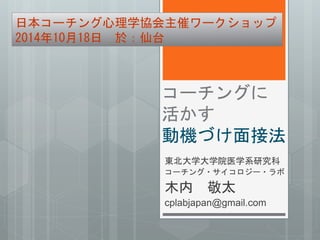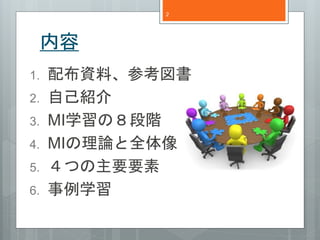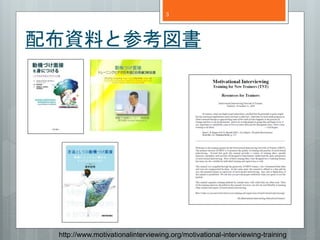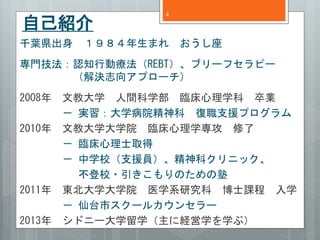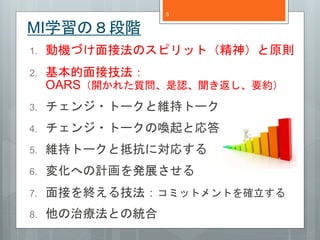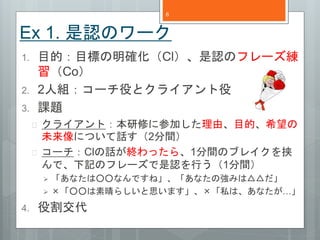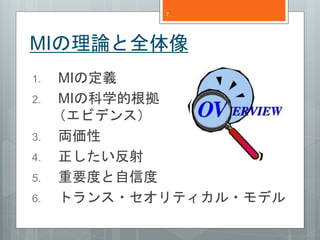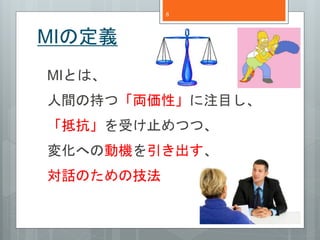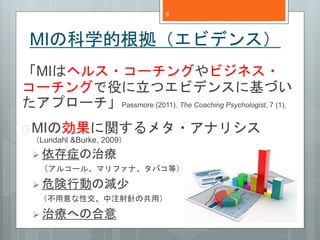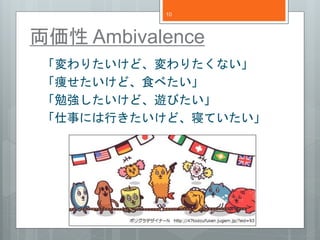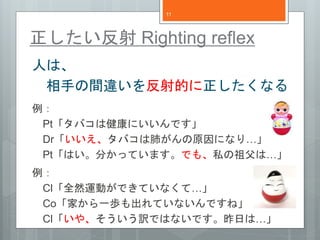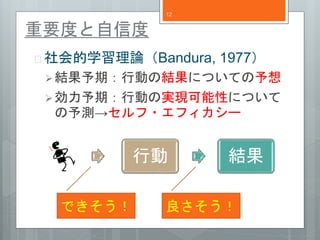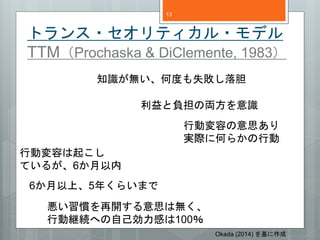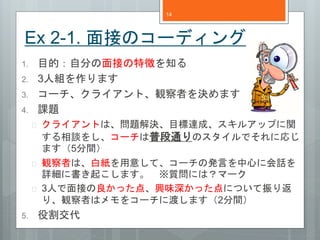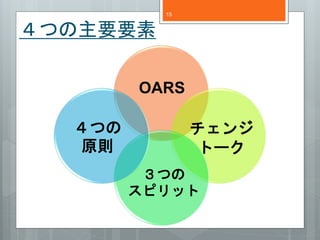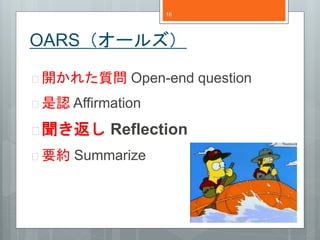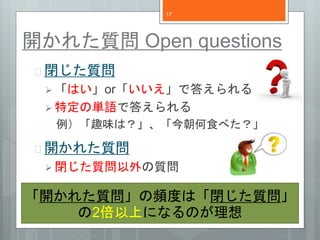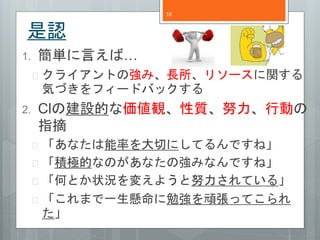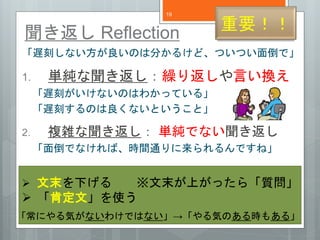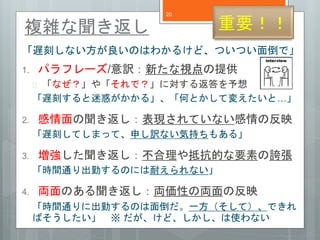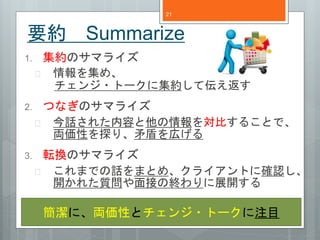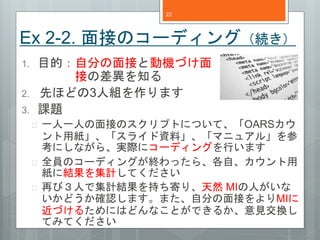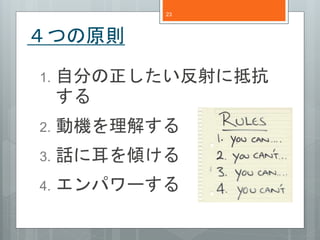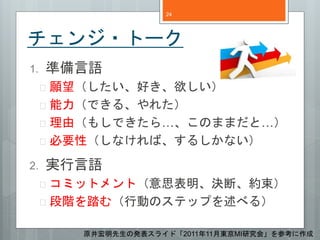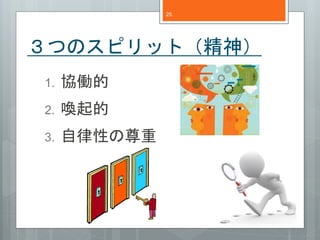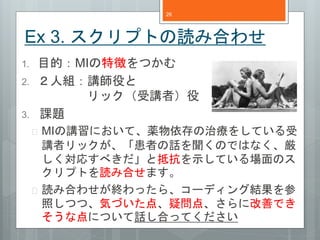コーチングに活かす动机づけ面接法(木内)
- 1. 日本コーチング心理学協会主催ワークショップ 2014年10月18日於:仙台 コーチングに 活かす 動機づけ面接法 東北大学大学院医学系研究科 コーチング?サイコロジー?ラボ 木内敬太 cplabjapan@gmail.com
- 2. 内容 1. 配布資料、参考図書 2. 自己紹介 3. MI学習の8段階 4. MIの理論と全体像 5. 4つの主要要素 6. 事例学習 2
- 4. 4 自己紹介 千葉県出身1984年生まれおうし座 専門技法:認知行動療法(REBT)、ブリーフセラピー (解決志向アプローチ) 2008年文教大学人間科学部臨床心理学科卒業 - 実習:大学病院精神科復職支援プログラム 2010年文教大学大学院臨床心理学専攻修了 - 臨床心理士取得 - 中学校(支援員)、精神科クリニック、 不登校?引きこもりのための塾 2011年東北大学大学院医学系研究科博士課程入学 - 仙台市スクールカウンセラー 2013年シドニー大学留学(主に経営学を学ぶ)
- 5. MI学習の8段階 1. 動機づけ面接法のスピリット(精神)と原則 2. 基本的面接技法: OARS(開かれた質問、是認、聞き返し、要約) 3. チェンジ?トークと維持トーク 4. チェンジ?トークの喚起と応答 5. 維持トークと抵抗に対応する 6. 変化への計画を発展させる 7. 面接を終える技法:コミットメントを確立する 8. 他の治療法との統合 5
- 6. Ex 1. 是認のワーク 1. 目的:目標の明確化(Cl)、是認のフレーズ練 習(Co) 2. 2人組:コーチ役とクライアント役 3. 課題 ? クライアント:本研修に参加した理由、目的、希望の 未来像について話す(2分間) ? コーチ:Clの話が終わったら、1分間のブレイクを挟 んで、下記のフレーズで是認を行う(1分間) ? 「あなたは○○なんですね」、「あなたの強みは△△だ」 ? ×「○○は素晴らしいと思います」、×「私は、あなたが…」 4. 役割交代 6
- 7. 7 MIの理論と全体像 1. MIの定義 2. MIの科学的根拠 (エビデンス) 3. 両価性 4. 正したい反射 5. 重要度と自信度 6. トランス?セオリティカル?モデル
- 8. MIの定義 8 MIとは、 人間の持つ「両価性」に注目し、 「抵抗」を受け止めつつ、 変化への動機を引き出す、 対話のための技法
- 9. MIの科学的根拠(エビデンス) 「MIはヘルス?コーチングやビジネス? コーチングで役に立つエビデンスに基づい たアプローチ」Passmore (2011). The Coaching Psychologist, 7 (1). ? MIの効果に関するメタ?アナリシス (Lundahl &Burke, 2009) ? 依存症の治療 (アルコール、マリファナ、タバコ等) ? 危険行動の減少 (不用意な性交、中注射針の共用) ? 治療への合意 9
- 10. 10 両価性Ambivalence 「変わりたいけど、変わりたくない」 「痩せたいけど、食べたい」 「勉強したいけど、遊びたい」 「仕事には行きたいけど、寝ていたい」
- 11. 11 正したい反射Righting reflex 人は、 相手の間違いを反射的に正したくなる 例: Pt「タバコは健康にいいんです」 Dr「いいえ、タバコは肺がんの原因になり…」 Pt「はい。分かっています。でも、私の祖父は…」 例: Cl「全然運動ができていなくて…」 Co「家から一歩も出れていないんですね」 Cl「いや、そういう訳ではないです。昨日は…」
- 12. 重要度と自信度 12 ? 社会的学習理論(Bandura, 1977) ?結果予期:行動の結果についての予想 ?効力予期:行動の実現可能性について の予測→セルフ?エフィカシー 行動結果 できそう! 良さそう!
- 13. トランス?セオリティカル?モデル TTM(Prochaska & DiClemente, 1983) 知識が無い、何度も失敗し落胆 利益と負担の両方を意識 行動変容の意思あり 実際に何らかの行動 行動変容は起こし ているが、6か月以内 6か月以上、5年くらいまで 悪い習慣を再開する意思は無く、 行動継続への自己効力感は100% Okada (2014) を基に作成 13
- 14. Ex 2-1. 面接のコーディング 1. 目的:自分の面接の特徴を知る 2. 3人組を作ります 3. コーチ、クライアント、観察者を決めます 4. 課題 ? クライアントは、問題解決、目標達成、スキルアップに関 する相談をし、コーチは普段通りのスタイルでそれに応じ ます(5分間) ? 観察者は、白紙を用意して、コーチの発言を中心に会話を 詳細に書き起こします。※質問には?マーク ? 3人で面接の良かった点、興味深かった点について振り返 り、観察者はメモをコーチに渡します(2分間) 5. 役割交代 14
- 15. 4つの主要要素 15 OARS チェンジ トーク 4つの 原則 3つの スピリット
- 16. OARS(オールズ) ? 開かれた質問Open-end question ? 是認Affirmation ? 聞き返しReflection ? 要約Summarize 16
- 17. 17 開かれた質問Open questions ? 閉じた質問 ? 「はい」or「いいえ」で答えられる ? 特定の単語で答えられる 例)「趣味は?」、「今朝何食べた?」 ? 開かれた質問 ? 閉じた質問以外の質問 「開かれた質問」の頻度は「閉じた質問」 の2倍以上になるのが理想
- 18. 是認 1. 簡単に言えば… 18 ? クライアントの強み、長所、リソースに関する 気づきをフィードバックする 2. Clの建設的な価値観、性質、努力、行動の 指摘 ? 「あなたは能率を大切にしてるんですね」 ? 「積極的なのがあなたの強みなんですね」 ? 「何とか状況を変えようと努力されている」 ? 「これまで一生懸命に勉強を頑張ってこられ た」
- 19. 重要!! 19 聞き返しReflection 「遅刻しない方が良いのは分かるけど、ついつい面倒で」 1. 単純な聞き返し:繰り返しや言い換え 「遅刻がいけないのはわかっている」 「遅刻するのは良くないということ」 2. 複雑な聞き返し: 単純でない聞き返し 「面倒でなければ、時間通りに来られるんですね」 ? 文末を下げる※文末が上がったら「質問」 ? 「肯定文」を使う 「常にやる気がないわけではない」→「やる気のある時もある」
- 20. 重要!! 20 複雑な聞き返し 「遅刻しない方が良いのはわかるけど、ついつい面倒で」 1. パラフレーズ/意訳:新たな視点の提供 ? 「なぜ?」や「それで?」に対する返答を予想 「遅刻すると迷惑がかかる」、「何とかして変えたいと…」 2. 感情面の聞き返し:表現されていない感情の反映 「遅刻してしまって、申し訳ない気持ちもある」 3. 増強した聞き返し:不合理や抵抗的な要素の誇張 「時間通り出勤するのには耐えられない」 4. 両面のある聞き返し:両価性の両面の反映 「時間通りに出勤するのは面倒だ。一方(そして)、できれ ばそうしたい」※ だが、けど、しかし、は使わない
- 21. 21 要約Summarize 1. 集約のサマライズ ? 情報を集め、 チェンジ?トークに集約して伝え返す 2. つなぎのサマライズ ? 今話された内容と他の情報を対比することで、 両価性を探り、矛盾を広げる 3. 転換のサマライズ ? これまでの話をまとめ、クライアントに確認し、 開かれた質問や面接の終わりに展開する 簡潔に、両価性とチェンジ?トークに注目
- 22. 22 Ex 2-2. 面接のコーディング(続き) 1. 目的:自分の面接と動機づけ面 接の差異を知る 2. 先ほどの3人組を作ります 3. 課題 ? 一人一人の面接のスクリプトについて、「OARSカウ ント用紙」、「スライド資料」、「マニュアル」を参 考にしながら、実際にコーディングを行います ? 全員のコーディングが終わったら、各自、カウント用 紙に結果を集計してください ? 再び3人で集計結果を持ち寄り、天然MIの人がいな いかどうか確認します。また、自分の面接をよりMIに 近づけるためにはどんなことができるか、意見交換し てみてください
- 23. 4つの原則 23 1. 自分の正したい反射に抵抗 する 2. 動機を理解する 3. 話に耳を傾ける 4. エンパワーする
- 24. 24 チェンジ?トーク 1. 準備言語 ? 願望(したい、好き、欲しい) ? 能力(できる、やれた) ? 理由(もしできたら…、このままだと…) ? 必要性(しなければ、するしかない) 2. 実行言語 ? コミットメント(意思表明、決断、約束) ? 段階を踏む(行動のステップを述べる) 原井宏明先生の発表スライド「2011年11月東京MI研究会」を参考に作成
- 25. 3つのスピリット(精神) 1. 協働的 2. 喚起的 3. 自律性の尊重 25
- 26. 26 Ex 3. スクリプトの読み合わせ 1. 目的:MIの特徴をつかむ 2. 2人組:講師役と リック(受講者)役 3. 課題 ? MIの講習において、薬物依存の治療をしている受 講者リックが、「患者の話を聞くのではなく、厳 しく対応すべきだ」と抵抗を示している場面のス クリプトを読み合せます。 ? 読み合わせが終わったら、コーディング結果を参 照しつつ、気づいた点、疑問点、さらに改善でき そうな点について話し合ってください

